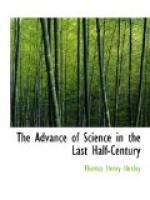An incalculable benefit has accrued to geological science from the accurate and detailed surveys, which have now been executed by skilled geologists employed by the Governments of all parts of the civilised world. In geology, the study of large maps is as important as it is said to be in politics; and sections, on a true scale, are even more important, in so far as they are essential to the apprehension of the extraordinary insignificance of geological perturbations in relation to the whole mass of our planet. It should never be forgotten that what we call ‘catastrophes,’ are, in relation to the earth, changes, the equivalents of which would be well represented by the development of a few pimples, or the scratch of a pin, on a man’s head. Vast regions of the earth’s surface remain geologically unknown; but the area already fairly explored is many times greater than it was in 1837; and, in many parts of Europe and the United States, the structure of the superficial crust of the earth has been investigated with great minuteness.
The parallel between Biology and Geology, which I have drawn, is further illustrated by the modern growth of that branch of the science known as Petrology, which answers to Histology, and has made the microscope as essential an instrument to the geological as to the biological investigator.
The evidence of the importance of causes now in operation has been wonderfully enlarged by the study of glacial phenomena; by that of earthquakes and volcanoes; and by that of the efficacy of heat and cold, wind, rain, and rivers as agents of denudation and transport. On the other hand, the exploration of coral reefs and of the deposits now taking place at the bottom of the great oceans, has proved that, in animal and plant life, we have agents of reconstruction of a potency hitherto unsuspected.
There is no study better fitted than that of geology to impress upon men of general culture that conviction of the unbroken sequence of the order of natural phenomena, throughout the duration of the universe, which is the great, and perhaps the most important, effect of the increase of natural knowledge.




